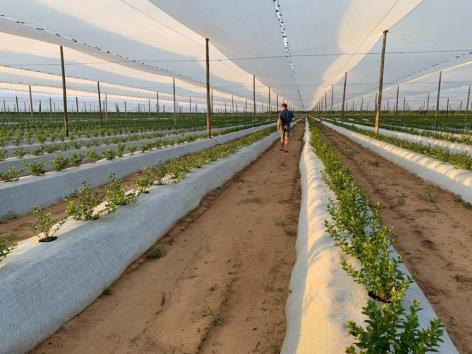
July 2020 saw the commencement of Namibia’s first-ever commercial harvest of blueberries by local company Mashare Berries Farming (Pty) Ltd. The historic harvest is currently underway on a 20 ha development located close to the Okavango River between Mashare and Mupapama villages in Kavango East, northern Namibia. The fruit is being sold and marketed under the trading name Namib Blue, and is earmarked for Namibian as well as international consumption. Exports are set to commence in August to markets across Europe and Asia and Indian Ocean islands, including Mauritius, the Maldives and the Seychelles.
According to Willem Mostert, Namibian manager of Cherry Irrigation, whose team designed and implemented the fully automated drip irrigation (and fertigation management) system for the landmark project, the quality of the fruit harvested has so far been exceptional.
“A few years ago, no one would have dreamed that you could grow high-quality blueberries in a country as dry as this, says the Namibian-born Mostert. “We’re proving what’s possible with the right planning, infrastructure and management in place.”
Mashare project director Albert Basson says the 2020 harvest is set to continue into late October. “We’re projecting a yield of up to 150 tonnes, as different varietals reach maturity. Currently, three varietals imported from the US-based grower Fall Creek have been planted on the property: AtlasBlue®, JupiterBlue® and BiancaBlue®. The plantings were established in November 2019, with 16 ha under net, 2 ha in tunnels and 2 ha of open field.”
Mashare Berries plans to double its production area by the end of 2021, with Cherry Irrigation on board for the expansion. “Ultimately, within the next five years we would like to expand blueberry cultivation across 200 ha to 300 ha of land in the region,” Basson adds.
Cherry Irrigation’s executive director, Charles Cherry, believes the success of the pilot project attests to the enormous untapped potential of arid or semi-arid regions. “These areas can effectively produce a range of crop types through careful water and resource management.
“We’re seeing first-hand from this development and others we’re involved with across Namibia that customised irrigation design is the way forward. Simply put, it ensures both environmental sustainability and commercial profitability over the long term,” he adds.
“The outlay of quality equipment, custom designs, smart technologies and AI (artificial intelligence) monitoring solutions may cost more initially. But for crops like blueberries that are (highly) sensitive to climatic conditions and soil and water quality, we believe this approach is crucial to success,” Cherry explains. “If you do it right, look at what you can achieve.”
Basson agrees. “We partnered with Cherry Irrigation after seeing their success with custom system designs for blueberry plantations in South Africa. Like us, they recognise the enormous agri-potential of Namibia that we are working to unlock.”
Mashare Berries is a subsidiary of Mashare Irrigation, which produces a variety of grains and vegetables, including wheat, maize, sorghum potatoes, onions and cauliflowers in Kavango East, for the local Namibian market.
“With the right teams, investors and companies on board, Namibia has the potential to be a world-class production hub for fresh goods,” says Cherry. “There is a big national drive to develop local resources properly and to produce more locally (fruit, vegetables, livestock fodder and other horticultural products), thereby reducing the need to import.
“Cherry Irrigation’s mandate is to properly support farmers in their quest to increase employment opportunities and improve food security in the country. We are proud to be part of this evolution. We’re bringing our knowledge and experience to the table to add value for the long haul. Blueberries are just the beginning.”







